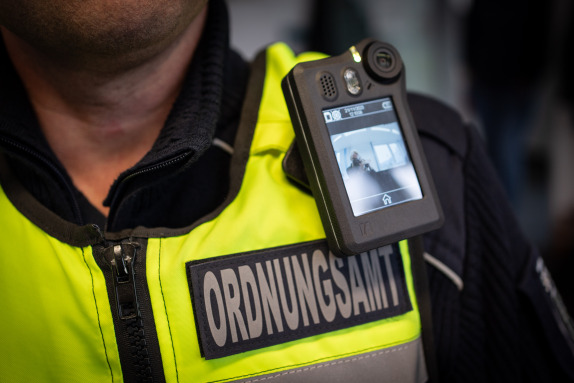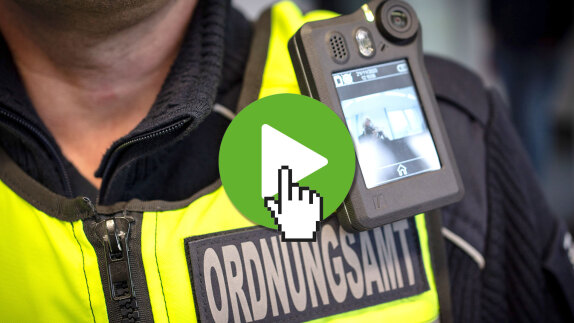29. November 2023
Public policy
For de-escalation: Bocholt public order office uses bodycams
Bocholt - In future, the employees of the city police in Bocholt will also be equipped with so-called body cams. These are cameras with a front display that are worn on clothing. Other cities are also focussing on this concept, which has been proven to help de-escalate dangerous situations.
The devices, which are roughly the size of a standard smartphone, are equipped with a camera and a display on the front. And there is a good reason for this: if a conflict situation arises during an operation, the city police officers can switch on the display by touching it. "The attacker can then see themselves on the display," explains Markus Telahr from the Public Order Department. And that has a de-escalating effect, explains Telahr.
According to the manufacturer Netco, the number of assaults in use has fallen by 75 per cent since the introduction of the bodycams in the city of Duisburg. The use of the cameras therefore primarily has a preventative function: conflicts are to be prevented before they can escalate.
Change in legislation enables use
Bodycams have already been used by police authorities for some time to document conflict situations. Their use by local law enforcement agencies has now been made possible by a change in the law in North Rhine-Westphalia. "Strict regulations apply to their use," says Markus Telahr. For example, the deployment has been agreed with the municipal data protection officer: If recordings are made, they are automatically deleted after a set period of time unless they are needed for the prosecution of criminal offences. Only public order officers with the appropriate authorisation have access to the video recordings.
"The law enforcement officers of the public order authorities, like the police and emergency services, are repeatedly exposed to verbal and violent assaults while on duty," states the draft law of the state of North Rhine-Westphalia. Such attacks and threats not only lead to physical harm, but also to mental and psychological stress for employees.
To protect law enforcement officers, law enforcement agencies ... should be given the opportunity to use modern technology, if necessary, to prevent violence against their employees and third parties as far as possible.
Notes on Article 7 d. Draft amendment to the NRW Administrative Enforcement Act
Frequently asked questions
Does the data end up on the network? How is it stored?
The bodycams do not have an internet connection; the data is stored locally and encrypted on the devices. After use, the videos are stored on a municipal server via a local connection. They also remain encrypted there and can only be decrypted with a password.
Do the cameras record permanently or are they only switched on when necessary?
Although the cameras have a pre-recording function, the data is not saved. The data is only recorded and saved locally on the device when an employee activates the device's display.
Further information can be found in our data protection information.
How long are the recordings stored?
The recorded media is removed from the local device after transfer to the municipal server. The videos remain on the server for a few days and are then automatically deleted. If a criminal offence is committed during use, the recordings can be stored separately so that they can be made available to the investigating authorities, for example.
Further information can be found in our data protection information.




